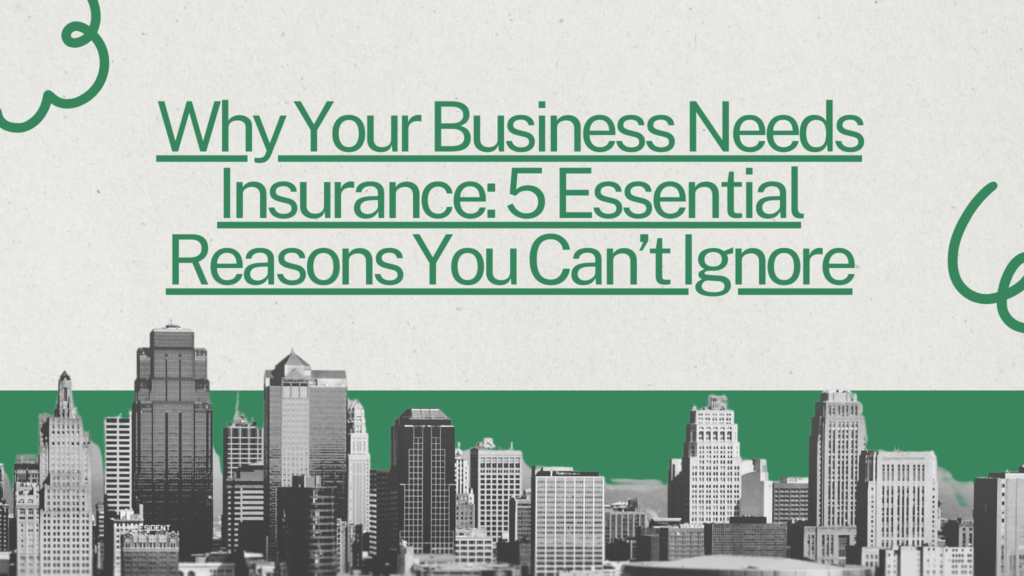Introduction
Imagine putting your heart and soul into your business, only to see it crumble because of an unforeseen event. Sounds terrifying, right? That’s where insurance steps in as your safety net. In this article, we will explore five essential reasons why having insurance is a non-negoti for any business. Whether you are just starting out or have in the game for years, these reasons demonstrate why securing insurance should be a top priority.
1. Protect Yourself Against Lawsuits
In today’s litigious society, every business faces the risk of legal action. Whether it’s a disgruntled employee or a dissatisfied customer, lawsuits can emerge from various corners.
Legal Defense Costs
Legal fees can quickly escalate, draining your financial resources even if you’re not at fault. According to the U.S. Chamber Institute for Legal Reform, small businesses spend nearly $105.4 billion a year on tort liability costs.
- Hiring legal counsel
- Court fees and settlements
- Time and resources spent on legal proceedings
Example: Imagine a customer slips and falls on your premises. Without insurance, you could be liable for tens of thousands of dollars in medical expenses and legal fees.
2. Safeguard Your Employees
Employees are the backbone of any business. Ensuring their safety and well-being should be a priority, and insurance can play a significant role in this.
Workers’ Compensation
Workers’ compensation insurance covers medical expenses and lost wages if employees are injured on the job.
“Your employees are your greatest asset. Protect them, and you protect your business.”
- Covers on-the-job injuries
- Provides wage replacement during recovery
- Shields your business from lawsuits related to workplace injuries
Example: An employee injures their back while lifting heavy boxes. Workers’ compensation can cover their medical bills and rehabilitation while offering peace of mind to both you and your staff.
3. Comply with Legal Requirements
Depending on your location and industry, various forms of insurance might be legally mandated.
Statutory Requirements
Failing to carry required insurance can result in severe penalties, including fines and business closure.
- General liability insurance
- Workers’ compensation insurance
- Commercial auto insurance
Example: In many states, businesses with employees are legally required to carry workers’ compensation insurance. Non-compliance can lead to significant penalties and even shut down your operations.
4. Protect Against Theft and Natural Disasters
Natural disasters and theft can strike without warning, wreaking havoc on your business assets. Insurance helps you recover financially from such unpredictable events.
Coverage for Property Damage
Property insurance can cover damages caused by fires, floods, storms, or theft, helping you restore your operations swiftly.
- Damage to office buildings and equipment
- Compensation for stolen or damaged inventory
- Business interruption insurance
Example: A severe storm damages your storefront. Property insurance can cover the repair costs, preventing a financial setback and allowing you to continue operations with minimal disruption.
5. Enhance Business Credibility and Trust
Having business insurance can make your company more attractive to clients and partners by demonstrating responsibility and financial stability.
Building Trust
Clients and partners are more likely to engage with businesses that are insured, viewing them as professional and reliable.
“Insurance isn’t just a safety measure; it’s a trust-builder for your business.”
- Evidences commitment to risk management
- Instills confidence in clients and partners
- Facilitates smoother business transactions
Example: A potential client may choose your insured business over a competitor without coverage, feeling more secure in the reliability and professionalism you exhibit.
Conclusion
In summary, business insurance isn’t just a precaution—it’s a critical component of a thriving, secure, and trustworthy operation. From protecting against legal actions and employee injuries to ensuring compliance with laws, safeguarding against disasters, and building credibility, the right insurance coverage is indispensable.
Don’t wait for a disaster to realize the importance of being insured. Act now to protect your business and ensure its long-term success.
5 Essential Reasons Why Your Business Needs Insurance
In the rapidly evolving landscape of modern business, navigating uncertainties is part and parcel of the entrepreneurial journey. From natural disasters to cybersecurity threats, businesses are continuallyhttps://sahankaab.site/10-million-business-insurance-the-importance-of-a-10-million-business/ exposed to various risks. So, how can businesses safeguard themselves against these potential pitfalls? The answer lies in business insurance. In this article, we will explore five essential reasons why your business needs insurance and how it can provide a safety net, allowing you to focus on growth and innovation.
1. Protection Against Legal Liabilities
Running a business involves dealing with various stakeholders, from employees and customers to suppliers and contractors. Each interaction carries its own set of risks, and sometimes things can go wrong, leading to potential legal disputes.
Mitigation of Lawsuits
No matter how diligent you are, there’s always a risk of facing a lawsuit. Whether it’s an employee injury, customer dissatisfaction, or breach of contract, legal battles can drain your finances and time.
- Lawsuit Costs: Legal fees, settlement costs, and damages can run into thousands or even millions of dollars.
- Reputation Management: Beyond financial implications, lawsuits can harm your business reputation and customer trust.
An example of a common lawsuit scenario is a slip-and-fall accident in your office premises. Liability insurance can cover medical expenses and legal fees, ensuring that one mishap doesn’t cripple your business.
2. Safeguarding Business Assets
Your business assets, including property, equipment, inventory, and intellectual property, are critical to your operations. Accidents, natural disasters, theft, or vandalism can cause significant damage or loss.
Coverage for Physical Assets
Physical damage to your business premises can halt operations and lead to substantial financial loss. Property insurance ensures that you can recover quickly without a massive hit to your finances.
- Fire, Theft, and Natural Disasters: Coverage for damages from unforeseen events ensures continuity.
- Equipment Breakdown: Insurance can cover repair or replacement costs, reducing downtime.
In 2018, California saw devastating wildfires impacting numerous businesses. Those with comprehensive property insurance were able to file claims and rebuild, while uninsured businesses struggled to recover.
3. Employee Protection and Retention
Employees are the backbone of any business. Protecting them through insurance not only showcases your commitment to their well-being but also plays a significant role in retention and satisfaction.
Health and Life Insurance
Offering health and life insurance as part of an employee benefits package can help attract and retain top talent. It also ensures that your employees remain healthy and productive.
- Group Health Plans: These can cover medical expenses, providing peace of mind for employees.
- Worker’s Compensation: Covers injuries sustained on the job, which is crucial for both employee support and legal compliance.
Productive workforce means fewer disruptions in operations and a more engaged team. Ensuring your employees feel valued can translate to reduced turnover and higher morale.
4. Financial Stability and Peace of Mind
Running a business is fraught with uncertainties. Having insurance offers a financial buffer, allowing you to navigate through difficult times without jeopardizing your business’s future.
Business Interruption Insurance
This type of insurance helps cover lost income and operating expenses if your business operations are halted due to a covered incident. This way, you won’t lose ground while recovering from unforeseen setbacks.
- Revenue Loss Coverage: Ensures that you can continue to pay fixed costs like salaries and rent.
- Operational Continuity: Allows prompt rebuilding and resuming of business activities.
Consider a scenario where a flood damages your office, leading to a temporary closure. Business interruption insurance can cover lost revenue while repairs are underway, ensuring your business stays afloat.
5. Compliance with Legal Requirements
Depending on your business type and location, having specific insurance coverages might be a legal requirement. Not complying with these regulations can lead to penalties, fines, and legal trouble.
Regulatory Compliance
Many states mandate businesses to carry workers’ compensation, unemployment, and disability insurance. Failing to meet these requirements can result in severe consequences.
- Avoiding Legal Penalties: Ensures your business is compliant with state and federal regulations.
- Building Credibility: Demonstrates that your business operates within legal standards, enhancing trust among stakeholders.
Moreover, having the necessary insurance coverages can make your business eligible for tenders and contracts that require proof of insurance compliance.
Conclusion
In summary, business insurance is not just an optional extra but a fundamental aspect of securing your business. From legal protection and asset safeguarding to employee benefits and regulatory compliance, the right insurance can provide the safety net that lets you focus on what you do best. So, take the proactive approach—evaluate your needs and ensure your business is adequately insured. Your business’s future might just depend on it.
“Insurance is the silent partner every business needs, offering solace in times of distress and ensuring smooth sailing on the entrepreneurial journey.”
By taking the crucial step of securing comprehensive insurance, you are investing in the resilience and sustainability of your business. Don’t wait for uncertainty to strike—act now and safeguard your business’s future.
Feel free to reach out to insurance professionals who can provide tailored advice based on your unique business needs. Taking this step today could save you from unforeseen mishaps tomorrow.


